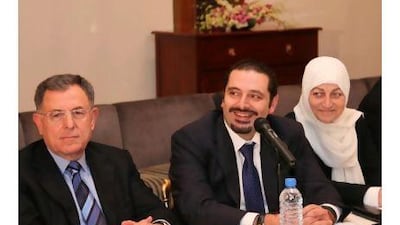BEIRUT // Hizbollah and its allies in Lebanon succeeded last week in forcing the collapse of the government of Saad Hariri, yet their efforts to tarnish the image of the former prime minister since then have, if anything, escalated.
Hassan Nasrallah, the leader of Hizbollah, devoted a major portion of his speech on Sunday evening to lampooning Mr Hariri, who is serving as caretaker premier until a new government is formed.
"Hariri and his team have established the fact that they cannot be trusted and are not reliable to help Lebanon or lead the country out of any impasse," Mr Nasrallah said from a secret location.
During his address, the Hizbollah leader also accused Mr Hariri of torpedoing a joint Syrian-Saudi Arabian initiative to end Lebanon's months-long impasse in favour of diplomacy by the United States and other western countries - in other words, turning against his Arab brethren.
The singling out of Mr Hariri in a rare broadcast speech came amid another campaign against him on New TV, a Lebanese television station close to Hizbollah.
On Saturday, the station began airing recordings of a meeting in 2007 between Mr Hariri and an investigator working for the United Nations tribunal investigating the assassination in 2005 of Mr Hariri's father and Lebanon's former premier, Rafik Hariri.
Another participant in the meeting was Mohammed Zuheir Siddiq, a witness who was later shown to have given false testimony to UN investigators. Mr Siddiq is one of the so-called "false witnesses" that members of the opposition, including Hizbollah, have been using as their key argument to discredit the work of the tribunal.
For months, Mr Hariri and his coalition allies have denied any knowledge of "false witnesses". But these recordings show Mr Hariri discussing Mr Siddiq's allegations with him. In the recordings, the former premier also refers to Lebanese officials as "stooges", blames Syria for his father's assassination and calls the Syrian president, Bashar al Assad, an "idiot".
With the Lebanese president, Michel Suleiman, postponing talks yesterday on forming a new government until January 24, the mudslinging is unlikely to subside any time soon, said Sami Baroudi, a professor of political science at Lebanese American University.
"This is part of the heated debate and you can relate it to the high stakes in the conflict and the steady degeneration of discourse between the parties," Mr Baroudi said. "Both sides are upping the ante because they see this as a major confrontation whose outcome will set the direction for months and years to come."
The delay of the parliamentary consultations appears to aim at giving time to outside diplomatic initiatives to run their course. The continuing crisis is likely, however, to further entrench the deep rifts in Lebanon's politics, Mr Baroudi noted.
"[The negative campaigns are] undermining the possibility of [new] national leaders emerging who have credibility nationally," he said. "This kind of discourse will only reinforce sectarianism in Lebanon."
At the heart of Lebanon's political crisis is the UN tribunal. Since rumours surfaced months ago that it would indict members of Hizbollah for the Hariri killing, the Shiite group and its allies have been keen to stigmatise the court, calling it a US-Israeli plot against the organisation. They also say that they will not agree to any new government headed by Mr Hariri and his Future Movement unless he agrees to cut Lebanon's ties with the tribunal.
"Lebanon cannot continue with the Hariri policy, which is destroying Lebanon," Michel Aoun, a powerful Christian leader and ally of Hizbollah, told reporters yesterday. Mr Hariri and his allies, however, insist that the Lebanese government should continue its support for the tribunal and that it should be allowed to complete its investigation and try those responsible for the murder of Hariri.
They were joined yesterday by the UN secretary general, Ban Ki-moon, speaking to reporters in Abu Dhabi, where he was attending the World Future Energy Summit. Mr Ban said no one should "politicise the work of the tribunal", saying it was "part of an international judiciary process and should be fully respected by the international community, including the people of Lebanon".
Tensions remained high in Beirut yesterday. The caretaker foreign minister, Ali Shami, summoned the US ambassador and criticised her for what he said was intervention in the country's domestic affairs. The envoy, Maura Connelly, met legislator Nicolas Fattouch on Sunday. An unnamed embassy spokesman told Agence France-Presse that such contacts were part of its "diplomatic mission".
* With additional reporting by Vesela Todorova in Abu Dhabi

